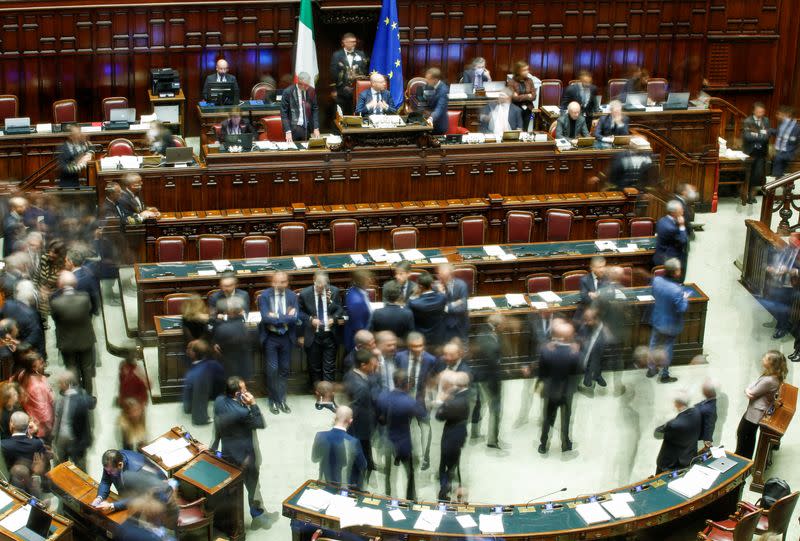Italy to hike 2020-22 budget deficits due to green incentives, sources say

By Gavin Jones, Giuseppe Fonte and Valentina Consiglio
ROME (Reuters) -Italy's budget deficit over the last three years will be higher than previously stated when new public finance figures are released next week, sources close to the matter told Reuters.
The reason is a ruling this month by the European Union's statistics agency Eurostat regarding the way tax credits are classified in state accounts, which strongly impacts costly Italian schemes offering incentives for energy saving home improvements.
The ruling lies behind Rome's decision last week to sharply curtail the programmes in order not to undermine this year's state finances, despite the boost they had provided to the construction sector and the economy in general.
"Growth is set to be impacted negatively in 2023-24 as the fiscal stimulus is removed," Citi Research said in a report.
"Higher cash needs over the coming years plus slowing real GDP growth will make it more challenging for the government to set the debt-GDP ratio on a clear downtrend."
The budget deficits from 2020 and 2022 will be hiked by a total of between 35 billion euros ($37.26 billion) and 42 billion euros, one of the sources said. A second official estimated around 40 billion euros over the period.
The impact will be strongest in 2021 and 2022, the sources, who declined to be named due to the sensitivity of the subject, said. The 2021 deficit, originally reported at 7.2% of gross domestic product, is now seen closer to 8%.
In November, Giorgia Meloni's government forecast the 2022 deficit would fall to 5.6%, but the figure may exceed 7% when Italy's statistics bureau ISTAT issues the data on March 1.
After a year of discussion among finance ministries, central banks and statistics bureaus, on Feb. 16 Eurostat published new EU-wide criteria for compiling public finance data.
The impact is particularly strong on high-debt Italy due to popular schemes it launched in 2020 allowing people to green up their homes using a complex system of tradeable tax credits.
"SUPERBONUS"
Under the programme, homeowners could deduct the cost of the building work from their taxes over a 5-10 year period, or sell the tax credit to their builder as a form of payment.
The builder could then sell it on to a bank, which would deduct the sum from its own tax bill.
The take-up of schemes, including the so-called "superbonus" where the state promised to pay out 110% of the cost of renovations, was greater than expected, generating an estimated 110 billion euros of work against forecasts of 72 billion euros.
Under Eurostat's new rulebook, the building incentives fall into a category of tax credits deemed "payable", which means they are highly likely to be cashed in.
This is because they meet three criteria set out by the agency: they are tradeable; they can offset taxes already owed; and they can be detracted from tax liabilities in future years.
The credits must be added to the budget deficit in the year they are used, Eurostat decreed, rather than when they materially impact tax revenues, resulting in the upward revisions to Italy's fiscal gap for the three years.
Fearing a big hit to this year's accounts, Meloni last week abruptly banned the sale of further tax credits, leaving thousands of building firms and families in financial distress, saddled with credits they are unable to cash in.
"If we had left the superbonus as it is, we would have had no money left in the budget for anything else," Meloni said.
($1 = 0.9394 euros)
(editing by Sharon Singleton)

 Yahoo Finance
Yahoo Finance 